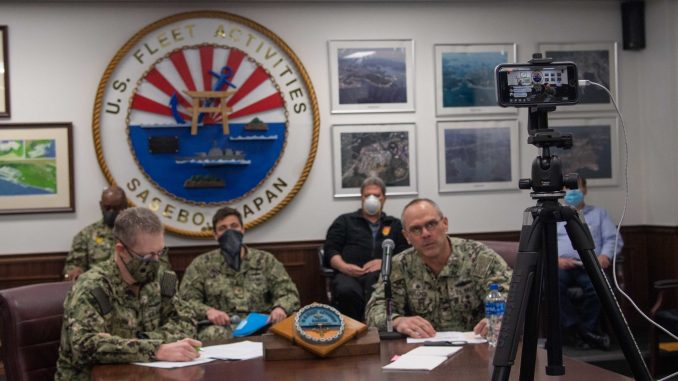

MARINE CORPS AIR STATION IWAKUNI, Japan — The commander in charge of Sasebo Naval Base in southwestern Japan began a recent Q&A session on Facebook Live with a sweeping update of the coronavirus pandemic.
Capt. Brad Stallings put the number of American lives the disease had claimed in terms of the wars the country has waged: 24 times more than the Afghan war, 11 times the Iraq conflict, twice as many as the American Revolution and nearly the same number of American servicemembers killed in Vietnam.
“That’s sobering, and that’s in under two months,” he said April 23. “Our country is hurting.”
During the pandemic, service members have been listening to their leaders in more relaxed settings via social media instead of morning formations or auditorium assemblies.
Commanding officers around bases in Japan are using Facebook Live, for example, to update base restrictions, quell rumors, upbraid rule breakers and inspire their troops to stay the course.
The exchange is two-way, as leaders like Stallings respond to questions coming at them, although often filtered by public affairs officers, in real time. Service members, their families and civilian employees meanwhile take in the show anonymously on their home screens, tapping out questions and hitting emoji buttons.
At Marine Corps Air Station Iwakuni, base commander Col. Lance Lewis said his team began preparing for the coronavirus in January.
Lewis said he quickly realized the pandemic would not just be a Marine Corps problem, it would affect 13,500 people within his responsibility — Marines, Sailors, their families and civilian employees, including Japanese citizens, working on base.
He needed to communicate rapidly across 30 tenant commands, including a Marine air group and Navy and Japanese air wings.
Lewis focused on a social media campaign using the air station’s official Facebook page to counter misinformation while providing frequent updates of timely, accurate information.
He borrowed a technique from U.S. military commanders in Korea and Europe who were first to confront the virus on U.S. installations, Lewis said during a May 1 interview with Stars and Stripes. He personally penned Facebook updates nearly every day during the first six weeks of the Defense Department’s response to the pandemic.
Lewis employed a Marine Corps Communications Strategy and Operations team to produce his messaging. The shop employs public relations specialists, photographers, broadcasters and videographers.
Lewis said his priority was providing accurate information from credible, trustworthy sources right from the get-go.
Initially, Navy doctors at the base’s Branch Health Clinic provided medical information, Lewis said. He said he used direct quotes from the U.S. Centers for Disease Control and Prevention to refute rumors circulating on social media.
“We were very open and honest with our procedures, and the ‘why’ behind things,” he said. “Instead of saying, ‘Wear masks!’ full stop. It was ‘We need to wear masks because …'”
In some cases, commanders used social media to confirm rumors. Stallings used the base Facebook page May 4 to announce that some sailors had violated movement restrictions over a previous weekend.
In other sessions, he, like other commanders, connected with his troops in more personal ways. During a livestream last month, Stallings shared that he had lost a cousin to the coronavirus and would be unable to attend the funeral.
“It’s frustrating in so many ways to be stuck at home,” he said.
Spontaneously or on cue, commanders also displayed flashes of wit.
Lewis, for example, in an April 20 post explained that the city of Hiroshima is off limits, take-out from off-base restaurants is not allowed and face coverings are required indoors.
“Finally, to put one of the longest standing arguments known to man to rest, ‘The Empire Strikes Back’ is and has always been the best Star Wars movie,” he concluded.
Lewis said that just as the Marine Corps developed its communications strategy units from lessons learned in Iraq and Afghanistan, the pandemic has added its own page to that story.
Disseminating accurate information and crushing misinformation is now a focus of military leaders, he said. Responding to coronavirus is teaching leaders up and down the chain of command how to do it with compassion, humor, and gravity to reach the widest possible audience.
Read more: Lawmakers Consider Blocking Some F-35 Deployments over Huawei 5G Network: Reports
© Copyright 2020 Stars and Stripes. All rights reserved. This material may not be published, broadcast, rewritten or redistributed.





Be the first to comment